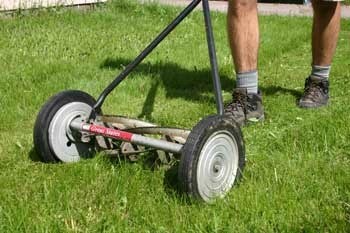
We spend a lot of time trying to achieve the perfect lawn. Most of our energy is directed at discouraging the plants we don't want by using weed killing herbicides and insect eradicating pesticides-chemicals that are known to be poisonous. There is a healthier and easier way based on the principle that "less is more." The key is to encourage the plants we do want by optimizing the conditions that encourage grass growth.
Don't mow your lawn every week. Keep your grass at a consistent height and mow only when your lawn needs it. The depth of grass roots is directly proportional to the height of grass blades.
Maintaining a healthy height of 3-3 1/2 inches is the single most important thing you can do to improve the health of your lawn. Mow when your grass reaches 4 inches so that you're always removing about 1/3 of the blade. Make sure your blades are sharp so they cut the grass rather than tear it.
Maintaining your grass at 3 inches will help it survive dry periods without extra watering. Most grasses naturally "rest" during the dry, hot parts of summer. Your lawn may look more brown and dead, but this period of dormancy if often normal.
Water your lawn only after 7 days without rain. Water early in the morning (between 6 and 10 a.m.) and thoroughly soak the ground with 1" of water. Avoid windy days to minimize water lost to evaporation.
Get your soil tested. If your soil isn't deficient in nutrients don't add fertilizer.
Leaving grass clippings on the lawn to decompose can provide nearly half of the nitrogen needed for a healthy yard. Clippings break down quickly without promoting disease or thatch buildup.
If you do use fertilizer, use it in the fall when grass plants focus their energy on root activity. Strong roots provide the best stimulation for vigorous growth in the spring.
Leaving grass clippings on the ground for fertilizer allows you to rake less, except to clean up fallen leaves. If raking in the spring, rake gently to avoid pulling up the young grass plants.
Plant varieties designed to succeed in your region's growing conditions. Most grass varieties need 6 hours of full sun each day. If your yard receives less, plant shade-tolerant varieties.
Consider planting types of ground cover other than grass if your yard is very shady.
Using herbicides to control weeds is like treating the symptoms of a cold. You may kill the weeds, but you won't change the condition that allowed the weeds to grow.
A weed-free lawn isn't necessarily healthy. Weeds function to alert you to what needs improving: too shady, poor drainage, low in nutrients, grass is too thin, etc.
Optimize the conditions that favor grass and weeds won't have a chance to get established.
If you do have weeds, interrupt their cycle of seed production by digging up the roots or cutting off the flowers before they go to seed. Make sure you replace the empty hole with the appropriate grass seed and keep it damp until it germinates.

About The Author: Ellen Brown is an environmental writer and photographer and the owner of Sustainable Media, an environmental media company that specializes in helping businesses and organizations promote eco-friendly products and services.
Add your voice! Click below to comment. ThriftyFun is powered by your wisdom!
Very good advice. I hope others take heed to your advice so less harmful chemicals are used in our environment.
We use NO chemicals on our lawn and we get lots of compliments about it's appearance.
Thanx Ellen.
Ellen, thanks for a full treatment of a good topic. How do you use compost on your lawn, if at all? My soil is pitiful totally. I moved in here last year, they put down "TOPSOIL" (haw haw) and sod. The soil is fine clay, Mt.St.Helens Ash, and sand, not a bacterium or fungus or nutrient anywhere.
Add your voice! Click below to comment. ThriftyFun is powered by your wisdom!